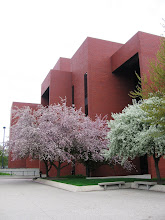Ball State University Libraries Staff Collaborate to Make Middletown Digital Oral History Collection Searchable
Researchers can now search 42 oral history interviews in the Middletown Digital Oral History Collection, at http://libx.bsu.edu/MidOrHist/midorhist.php.
For the Middletown Jewish Oral History Project I, Dr. Warren Vander Hill conducted interviews with Martin Schwartz and Mort Pazol, among others. The Black Muncie Oral History Project, conducted by Hurley C. Goodall and J. Paul Mitchell, includes interviews with Muncie, Indiana citizens such as Ray Buley and Lucille Williams.
Each oral history interview includes a streaming wma audio file and a transcript in PDF format. The inclusion of transcripts makes it possible for researchers to read along as they listen to the interviews or identify specific sections of the interview for listening. By providing the transcripts in PDF format, users can also print them for further study and analysis.
The transcripts provide students and faculty with several ways to search the collection. They can search each transcript for subjects, names, or places as well as search across all of the oral history interviews and the larger Ball State University Digital Media Repository, a project of the University Libraries.
Writing transcripts to accompany the oral history interviews has been a combined effort of people throughout the University Libraries, including staff and student assistants from various units within these groups:
· Access Services
· Acquisitions Services
· Archives and Special Collections Research Center
· Cataloging and Metadata Services
· Center for Middletown Studies
· Geospatial Center and Map Collections
· Metadata and Digital Initiatives
These personnel have spent many hours listening to the interviews to ensure that the transcripts are accurate. The transcripts are then checked and rechecked at least twice by Archives and Special Collections Research Center and Collection Resources Management personnel for accuracy.
In our training for this project, we selected the Baylor University Institute for Oral History Transcribing Style Guide. This document guided us in transcribing the words, speech patterns, and thought patterns of the interviewees and interviewers in a way that is easy to read and uniform in structure. Copies of this guide were given to each project participant, and the guide has helped to answer many questions, such as when to include and when not to include crutch words, like ‘hm,’ ‘uh-hm,’ and ‘unh-uh.’
Metadata and Digital Initiatives personnel also created an Oral Histories Wiki which assisted in ongoing training,www.bsu.edu/libraries/wiki/index.php?title=Oral_Histories.
Using the Wiki, we share any areas not covered in the style guide with the personnel working on the project. For example, we have included “Common Capitalization and Spelling Questions,” a list of specific terms that have come up in the interviews, such as words related to Jewish and Catholic religious practices.
The City Directories and several other manuscript collections in the Archives and Special Collections Research Center have been useful in checking the spellings of names and places in Muncie, Indiana, that are often mentioned in the interviews. We have also used collections already available in the Digital Media Repository e.g., The Muncie Times and the Other Side of Middletown photographs.
To facilitate locating oral histories, metadata records have been created for each interview using Dublin Core, a back-end standard used to describe digital content in a consistent way. We created user-friendly fields, such as Interviewee, Interviewer, Date Recorded, Duration, and Subject.
In addition to providing useful information about the oral histories, metadata records allow the collection to be searched within the larger Ball State University Digital Media Repository. For example, if you do an exact phrase search for Marion, Indiana, you will find digital objects from several collections including oral histories, audio newscasts, and newspaper issues.
Another tool implemented in this collection is controlled vocabulary. In this case, controlled vocabulary refers to a standard list of authorized terms like names, places, and subjects used to describe digital artifacts in metadata records. While the Digital Media Repository can be searched using natural language, inputting descriptors in this controlled way makes it easier for researchers to find all the information related to a specific topic. For example, when referring to the Black Muncie History Project’s interviewer Hurley C. Goodall, we enter Goodall, Hurley C. Clicking on this personal name will bring up all of his interviews in the collection.
For information on the process of transcribing and describing oral history interviews, contact Amanda A. Hurford, Digital Initiatives Multimedia Developer, AAHurford@bsu.edu, (765) 285-3349 or Maren L. Read, Assistant Archivist for Manuscript Collections, MLRead@bsu.edu, (765) 285-5078.
This newsletter article first appeared in The Library Insider 5(3): 9; March 2007.
Labels: Ball State University Libraries, digital media, library, Middletown, Muncie, newsletter, oral history


